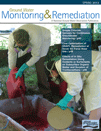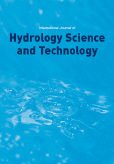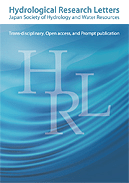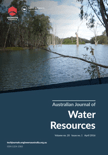
GROUND WATER MONITORING AND REMEDIATION
Scope & Guideline
Transforming challenges into solutions in groundwater monitoring.
Introduction
Aims and Scopes
- Groundwater Contamination Assessment:
The journal emphasizes the assessment of groundwater contamination, including methodologies for identifying and quantifying contaminants such as PFAS, VOCs, and other hazardous substances. - Innovative Remediation Technologies:
A core focus is on the development and evaluation of innovative remediation technologies aimed at restoring contaminated groundwater and soils, including bioremediation, thermal treatment, and chemical oxidation. - Hydrogeological Modeling and Analysis:
The journal covers hydrogeological modeling techniques that aid in understanding groundwater flow and contaminant transport, including statistical and machine learning approaches. - Regulatory and Policy Frameworks:
Discussion on the regulatory aspects of groundwater management, including compliance with federal and state regulations, and the implications of new policies on groundwater protection. - Data Management and Technology Integration:
The integration of modern data management tools and technologies for groundwater monitoring, including sensor technology and data analytics, is a significant theme within the journal. - Community Engagement and Education:
The journal highlights the importance of community engagement in groundwater management and the role of educational initiatives in promoting better understanding and practices.
Trending and Emerging
- PFAS Contamination and Remediation:
Recent publications have highlighted a surge in research surrounding PFAS, driven by regulatory changes and public health concerns, focusing on detection, assessment, and innovative remediation techniques. - Impact of Climate Change on Groundwater Systems:
Emerging studies are increasingly addressing the effects of climate change on groundwater dynamics, including changes in recharge rates, contaminant transport, and the resilience of aquifers. - Integration of Advanced Technologies in Groundwater Monitoring:
There is a growing emphasis on the application of advanced technologies, such as UAVs, remote sensing, and real-time monitoring systems, to enhance groundwater monitoring and data collection. - Community-Centric Approaches to Groundwater Management:
An emerging theme is the importance of community involvement and stakeholder engagement in groundwater management, reflecting a shift towards more inclusive and participatory practices. - Biogeochemical Processes in Remediation:
Research focusing on the biogeochemical processes that influence the effectiveness of remediation techniques is gaining traction, especially in relation to natural attenuation and bioremediation strategies.
Declining or Waning
- Traditional Groundwater Sampling Techniques:
There is a noticeable decrease in publications focused on traditional groundwater sampling methods, as newer technologies and methodologies gain prominence in groundwater research. - General Groundwater Quality Studies:
Studies that broadly address groundwater quality without the application of specific innovative techniques or technologies have become less frequent, overshadowed by more targeted research. - Historical Case Studies of Groundwater Contamination:
While historical case studies are valuable, their prevalence has declined as the journal shifts towards more contemporary issues and innovative solutions in groundwater management. - Non-Contaminant Focused Hydrogeology:
Research that does not directly address contamination or remediation, such as purely geological studies of aquifers, appears to be diminishing in favor of applied research relevant to current environmental challenges.
Similar Journals

Journal of Hazardous Materials Letters
Advancing knowledge on hazardous materials for a safer tomorrow.Journal of Hazardous Materials Letters, published by ELSEVIER, is a premier open access journal that has rapidly gained prominence in the fields of Environmental Chemistry, Environmental Engineering, Health, Toxicology and Mutagenesis, Pollution, and Waste Management and Disposal since its inception in 2020. With an impressive categorization in the top quartile (Q1) across all its relevant disciplines in 2023, this journal ranks favorably within the Scopus database, positioning itself in the upper echelons of Environmental Science—ranked 23rd in Environmental Engineering and 19th in Health, Toxicology and Mutagenesis among its peers. It serves as a vital platform for the dissemination of high-quality research focused on addressing hazardous materials and their impacts on health and the environment. The journal's commitment to open access facilitates immediate and broad dissemination of research findings, ensuring that essential knowledge reaches a global audience of researchers, professionals, and students eager to advance the field. With its ongoing convergence into 2024, the Journal of Hazardous Materials Letters continues to drive innovation and influence practice in managing hazardous materials for a sustainable future.

BOLETIN GEOLOGICO Y MINERO
Uncovering Earth's Secrets, One Study at a TimeBOLETIN GEOLOGICO Y MINERO is a significant academic journal published by the Instituto Geológico Minero de España, focusing on the fields of Geology and Geochemistry. Established in 1980, this journal provides a platform for researchers to disseminate vital studies and findings in the earth sciences, encompassing an array of topics from mineralogy to environmental geology. Despite its Q4 ranking in both Geochemistry and Petrology and Geology categories as of 2023, the journal serves as a resource for emerging research and innovative methodologies in these critical fields, promoting a deeper understanding of geological processes and materials. While currently operating without an open-access model, the journal is committed to advancing knowledge through rigorous peer-review standards. With its roots in Spain, the BOLETIN GEOLOGICO Y MINERO significantly contributes to the European geological research community and remains an invaluable resource for students, professionals, and researchers alike engaged in the pursuit of geological science.

Water Research X
Advancing sustainable solutions for our most precious resource.Water Research X is a prestigious journal published by ELSEVIER, focusing on the dynamic fields of water science and technology, pollution, ecological modeling, and waste management. Since its inception in 2018, this Open Access journal has become a cornerstone resource for researchers and professionals dedicated to advancing our understanding and management of water resources. Based in the United Kingdom, Water Research X holds an impressive ranking within the Scopus metrics, positioned in the Q1 category across multiple relevant disciplines, including Environmental Science, with a notable rank of 10/261 in Water Science and Technology and 3/41 in Ecological Modeling. This reflects its commitment to disseminating high-quality research that informs policy, supports sustainable practices, and fosters innovation in water management.

International Journal of Hydrology Science and Technology
Driving Sustainable Practices in Water Resource ManagementThe International Journal of Hydrology Science and Technology, published by InderScience Enterprises Ltd, is a distinguished platform dedicated to advancing knowledge in the field of hydrology, environmental engineering, and water science. With an ISSN of 2042-7808 and an E-ISSN of 2042-7816, this journal, established in 2011 and continuing through 2024, serves as an essential resource for researchers, professionals, and students alike. Despite being categorized in the Q3 quartile across multiple disciplines including Earth and Planetary Sciences, Environmental Engineering, Waste Management and Disposal, and Water Science and Technology, the journal maintains a reputation for contributing significant findings that impact both theory and practical applications in addressing hydrological challenges. Currently unavailable through Open Access options, the journal remains committed to disseminating valuable research that informs sustainable practices in water resource management. The editorial team encourages submissions that explore innovative strategies and methodologies while fostering interdisciplinary discussions, making this journal a pivotal player in shaping the future of hydrological science.

EQA-International Journal of Environmental Quality
Innovative research for a cleaner, greener world.EQA-International Journal of Environmental Quality, published by the University of Bologna, Department of Agricultural Sciences, is a premier open-access journal dedicated to the multidisciplinary exploration of environmental quality issues. Established in 2009, it aims to foster a greater understanding of the intricate interactions between human activities and environmental health. With a focus on innovative research, the journal contributes to the advancement of knowledge across diverse fields, making it an essential resource for researchers, professionals, and students engaged in environmental science and sustainability. The journal operates with an emphasis on accessibility, ensuring that critical findings reach a global audience without barriers. With an impressive Scopus rank of 88 out of 171, EQA stands as a significant platform for disseminating impactful research that informs policy and promotes environmental stewardship.

Hydrological Research Letters
Empowering Research: Navigating the Waters of DiscoveryHydrological Research Letters (ISSN: 1882-3416) is a distinguished peer-reviewed journal published by JSHWR, JAGH, JAHS, JSPH in Japan. Established with open access since 2007, this journal serves as a critical platform for the dissemination of innovative research in the field of hydrology, water science, and technology. With an increasing impact factor, currently positioned in the Q3 quartile for both Earth and Planetary Sciences and Water Science and Technology, it attracts a diverse readership keen to stay abreast of groundbreaking findings that shape water management and environmental policy. Researchers, professionals, and students alike will find this publication an invaluable resource for enhancing their understanding of hydrological processes and their implications. The journal is committed to fostering open academic dialogue and encouraging high-quality contributions during its converging years from 2015 to 2024. For more information, authors and readers can access the journal at its address, C/O INT ACAD PRINTING CO, LTD, Shinjuku-ku, Tokyo, Japan.

Journal of Applied Water Engineering and Research
Integrating Technology for Effective Water ManagementJournal of Applied Water Engineering and Research is a dynamic platform dedicated to the advancement of knowledge in the field of water science and technology. Published by Taylor & Francis Ltd, this journal aims to bridge the gap between theoretical research and practical applications in water engineering, providing a crucial resource for researchers, practitioners, and policymakers. With an ISSN of 2324-9676 and an impressive ranking in the Q3 category for Water Science and Technology, it occupies a distinctive position within the scholarly community. The journal covers a wide spectrum of topics, including innovative water management strategies, sustainable practices, and the integration of technology in water resource management, thus contributing significantly to the discourse surrounding environmental sustainability. With publication years converging from 2013 to 2024, the Journal of Applied Water Engineering and Research continues to foster impactful research, enhancing our understanding and management of vital water resources.

Australasian Journal of Water Resources
Elevating the Discourse on Water SustainabilityThe Australasian Journal of Water Resources, published by Taylor & Francis AS, stands as a pivotal resource in the field of water science and technology. With an ISSN of 1324-1583 and E-ISSN 2204-227X, this esteemed journal facilitates the dissemination of high-quality research articles that address critical issues facing water resources management across Australasia and beyond. Ranking in the Q2 category for Water Science and Technology as per the 2023 metrics, it boasts an impressive Scopus ranking of 75/261 in Environmental Science, placing it in the 71st percentile for its field. Spanning from 2008 to 2024, the journal emphasizes the importance of sustainable water practices, innovative technologies, and environmental policy, making it an invaluable asset for researchers, professionals, and students seeking to advance their knowledge and contribute to the discourse on water management challenges. The journal's rigorous peer-review process and commitment to open academic dialogue ensure that emerging trends and pioneering ideas receive the attention they deserve.

Groundwater for Sustainable Development
Empowering research for a water-secure future.Groundwater for Sustainable Development is a distinguished peer-reviewed journal published by Elsevier, committed to advancing knowledge and practice in the vital field of groundwater management. With an ISSN of 2352-801X, this journal not only focuses on the sustainable utilization of groundwater resources but also explores the intricate relationships between groundwater and various environmental factors. Established in 2015 and converging through 2024, the journal has garnered a reputation for excellence, reflected in its impressive rankings: Q2 in Environmental Chemistry, and Q1 in several categories, including Environmental Engineering, Geography, Planning and Development, and Water Science and Technology as of 2023. Moreover, its Scopus rankings affirm its significance, with a remarkable position in the top percentiles of social sciences and environmental sciences. The journal serves as an essential platform for researchers, professionals, and students seeking to contribute to sustainable groundwater practices, ensuring accessibility to impactful resources and cutting-edge research that addresses contemporary challenges in water management.

Groundwater
Navigating the Future of Groundwater ResearchGroundwater is a premier academic journal published by WILEY, focusing on the critical intersection of hydrology, environmental science, and technology. Established in 1963, this journal has a rich tradition of publishing high-quality research and reviews that examine the complex dynamics of groundwater systems, their management, and their role in ecosystems and human society. With an impact factor reflecting its relevance and rigor, Groundwater ranks in the Q2 category for both Computers in Earth Sciences and Water Science and Technology as of 2023, underscoring its significance in these fields. It is crucial for researchers, professionals, and students striving to stay at the forefront of groundwater research and management methodologies. By providing insight into both theoretical frameworks and practical applications, Groundwater serves as an essential resource for addressing pressing water resource challenges.